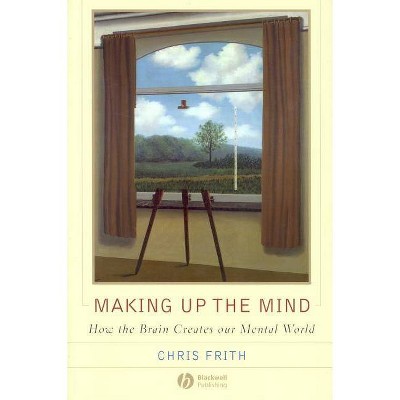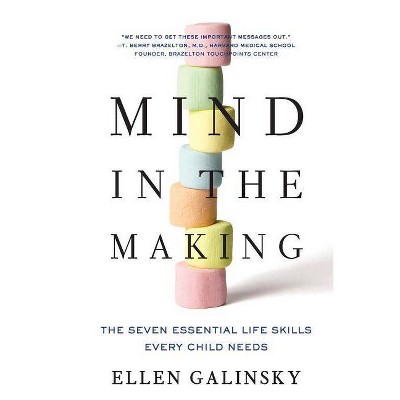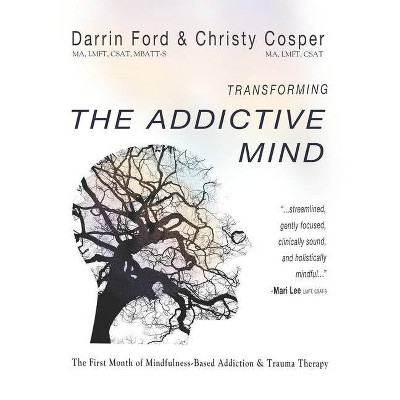Making Up the Mind - by Chris Frith (Paperback)

Similar Products
Products of same category from the store
AllProduct info
<p/><br></br><p><b> Book Synopsis </b></p></br></br>Written by one of the world's leading neuroscientists, <i>Making Up the Mind</i> is the first accessible account of experimental studies showing how the brain creates our mental world.<br /> <ul> <br /> </li> <li>Uses evidence from brain imaging, psychological experiments and studies of patients to explore the relationship between the mind and the brain<br /> </li> <li>Demonstrates that our knowledge of both the mental and physical comes to us through models created by our brain<br /> </li> <li>Shows how the brain makes communication of ideas from one mind to another possible</li> </ul><p/><br></br><p><b> From the Back Cover </b></p></br></br>Inside your head there is an amazing labor-saving device; more effective than the latest high-tech computer. Your brain frees you from the everyday tasks of moving about in the world around you, allowing you to concentrate on the things that are important to you: making friends and influencing people. However, the 'you' that is released into this social world is also a construction of your brain. It is your brain that enables you to share your mental life with the people around you.<br /> <p><i>Making up the Mind</i> is the first accessible account of experimental studies showing how the brain creates our mental world. Using evidence from brain imaging, psychological experiments, and studies with patients, Chris Frith, one of the world's leading neuroscientists, explores the relationship between the mind and the brain.</p><p/><br></br><p><b> Review Quotes </b></p></br></br><br><i>Making up the Mind</i> is an excellent 'big picture' book. Exactly as its subtitle indicates, this book describes how our brains construct an internal model of the world that enables us to successfully interact with others and generally navigate a complex world. (<i>Psychology Learning and Training</i>, Autumn 2008) <p>Neuroscience and psychology often struggle to answer the really interesting questions about the mind, but in this fascinating book, Chris Frith shows that science can finally start explaining how and why we experience the world as we do. Anyone interested in human nature - not just the nuts and bolts of neural circuits - will find his storytelling compelling. Frith delves into topics such as delusions, illusions, imagination and imitation, bringing clarity and insight to the simplest abservations and most complex experiments alike. <i>(New Scientist)</i></p> <p><i><br /> </i><i>Making up the Mind</i> is an interesting book to everybody who wants to learn more about how the brain gives rise to our mental experiences...As Frith himself depicts in a sort of framing story, you will easily find yourself talking about these ideas at your next dinner party, as well as use it for serious considerations on the brain or as a toolbox for next term's essay. A stimulating new book by a distinguished scientist who knows what he is talking about. ( <i>Metapsychology Online Reviews)</i><br /> </p> <p>Frith has produced an enthralling discussion on the subtle links between mind and brain, sometimes with humorous liaisons between himself, as narrator, and others who might be labelled as sceptics, unbelievers.<i>(Psychologist)</i></p> <p>"Stands apart from many that have been written lately ... For those who have time to read only one book ... this should be it. Essential."<i>(Choice Reviews)</i></p><br><p/><br></br><p><b> About the Author </b></p></br></br><b>Chris Frith </b>is Professor in Neuropsychology at the Wellcome Trust Centre for Neuroimaging at University College London. His publications include <i>Schizophrenia: A Very Short Introduction</i> (2003, with Eve C. Johnstone) and <i>The Neuroscience of Social Interaction</i> (2004, edited with Daniel Wolpert).
Price History
Price Archive shows prices from various stores, lets you see history and find the cheapest. There is no actual sale on the website. For all support, inquiry and suggestion messagescommunication@pricearchive.us




















